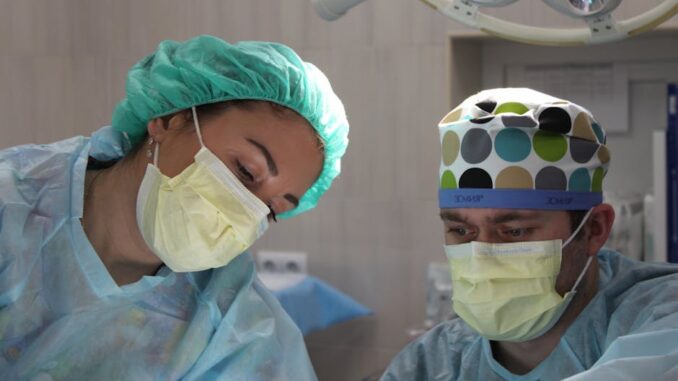
Summary
AI scribes are revolutionizing healthcare documentation, reducing administrative burdens, and improving patient care. By automating note-taking and administrative tasks, these tools free up physicians’ time, enhance accuracy, and foster better patient interactions. This shift allows physicians to focus on what truly matters: providing compassionate and high-quality care.
Start with a free consultation to discover how TrueNAS can transform your healthcare data management.
** Main Story**
Okay, so in today’s crazy-busy healthcare world, doctors are drowning in paperwork, right? It’s impacting their well-being and, of course, patient care. But there’s a potentially game-changing solution: AI scribes. These clever assistants are like having a super-efficient note-taker in the room. They listen to patient conversations and whip up detailed notes in real-time. And they slot right into electronic health record (EHR) systems, it’s pretty seamless. This tech is a game changer, maybe even paving the way for a healthcare system that is more efficient and revolves around the patient’s needs.
Freeing Up Physicians’ Time
One of the biggest perks? Seriously reduced documentation time. Doctors often spend hours after seeing patients, finalizing notes and dealing with administrative stuff. I mean, how annoying is that? This leads to burnout and dissatisfaction. AI scribes take a load off by automating the note-taking, freeing up precious time for what really matters: patients. Some studies show doctors can save like, an hour of keyboard time each day! Imagine what you could do with an extra hour in your day? Doctors can see more patients and address important issues, improving overall productivity. Plus, with quicker documentation, records are more timely and accurate. Win-win!
Accuracy and Streamlined Workflows
But it’s not just about speed. AI scribes are also about upping the accuracy and quality of clinical documentation. Because they’re capturing the entire patient-doctor conversation, there’s less chance of errors or missed info. These tools understand medical jargon and can put together structured notes. Think better communication, more informed decisions, and improved patient outcomes! And, they can handle things like drafting progress notes and pulling out medical codes; basically, they streamline workflows. The whole system is just smoother, and that benefits everyone.
Better Patient Interaction
Now, here’s where it gets really interesting. AI scribes can transform the doctor-patient relationship. Doctors aren’t constantly typing away on a computer. They can actually focus on listening to their patients, asking the right questions, and providing compassionate care. You know, really connect with them. Patients feel heard, understood, and confident in their care. It’s a more positive experience all around, I think. I once saw a doctor using an AI scribe with a particularly anxious patient, and the difference in the patient’s demeanor was amazing. It was like a weight had been lifted off their shoulders.
Breaking Down Language Barriers
And get this: many AI scribes are multilingual! This is especially useful in areas where many people speak different languages. These tools can create notes in English while the conversation is in another language, helping doctors overcome communication barriers. So, it promotes equal access to quality care, doesn’t it?
Embracing AI-Driven Healthcare
So, the widespread use of AI scribes has the potential to completely change healthcare delivery. As these tools continue to get better, they’ll reduce administrative burdens, boost accuracy, and help foster more compassionate patient care. Integrating AI scribes into healthcare systems is a big step towards a more efficient, patient-focused, and equitable future. By embracing these innovations, we can empower physicians to do what they do best: provide top-notch medical care to those who need it. And frankly, I think that’s a goal worth striving for.


The multilingual capabilities of AI scribes are particularly compelling. Could this technology also be adapted to translate real-time between doctor and patient, further bridging communication gaps and improving understanding during consultations?
That’s a fantastic point! Real-time translation could truly revolutionize consultations, especially in diverse communities. Imagine the improved clarity and trust it would foster. It would remove a significant barrier to equitable healthcare access. Such a valuable extension of the technology!
Editor: MedTechNews.Uk
Thank you to our Sponsor Esdebe
The potential for improved accuracy in clinical documentation is significant. This enhanced precision, coupled with structured notes, could also improve data analysis for population health management and preventative care initiatives.
Thanks for highlighting that! Improved data analysis through structured notes is key. Think about the potential for identifying trends, predicting outbreaks, and tailoring preventative care programs based on real-time insights. This enhanced level of analysis could lead to significant improvements in public health outcomes.
Editor: MedTechNews.Uk
Thank you to our Sponsor Esdebe
The point about multilingual AI scribes is exciting. Standardized medical terminology across languages could also significantly improve global research and collaboration efforts by facilitating easier data aggregation and analysis.
Absolutely! The potential for global research collaboration is huge. Imagine researchers seamlessly sharing insights, regardless of the language the original data was collected in. This could accelerate breakthroughs and lead to more effective treatments worldwide.
Editor: MedTechNews.Uk
Thank you to our Sponsor Esdebe
Multilingual AI scribes… imagine the possibilities for international medical tourism! “Come to sunny Spain for your knee replacement, our AI will translate your grunts of pain into perfect Castilian for the surgeons.”
That’s a funny but insightful take! You’re right, the potential for international medical tourism is definitely something to consider. Beyond just translation, AI scribes could also standardize documentation across different healthcare systems, making it easier for international patients to share their medical history and receive consistent care, wherever they are in the world.
Editor: MedTechNews.Uk
Thank you to our Sponsor Esdebe